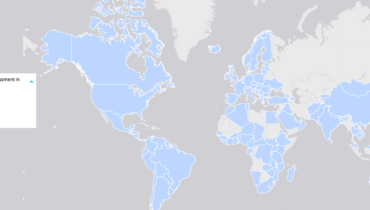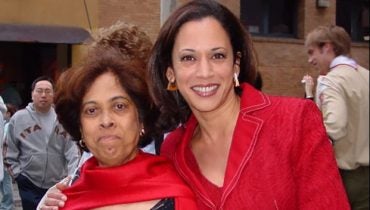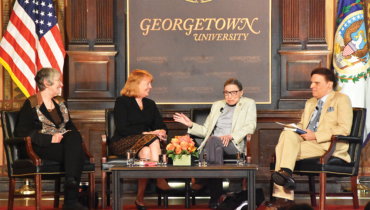Pari Ibrahim is the founder and executive director of the Free Yezidi Foundation, a non-profit organization that seeks to support and protect members of the Yazidi community—a religious minority based primarily in Northern Iraq.
The Islamic State of Iraq and the Levant (ISIS) is recognized by the United Nations as perpetrating a genocide against Yazidis in Iraq.
In August 2014, ISIS attacked the Sinjar region of Iraq, home to approximately 400,000 Yazidis, in an attempt to destroy the minority whom they labeled “devil-worshippers.” ISIS killed thousands of Yazidis and captured thousands more who were forced into manual labor, subjected to horrific sexual violence, or sold in slave markets.
Pari Ibrahim started the Free Yezidi Foundation (FYF) in response to this genocide.
This interview was conducted in May 2019. Parts of the interview have been edited for length and clarity.
Cira Mancuso: To start, is there an estimate of how many Yazidi women and girls are still in captivity? And for the survivors, what is life like right now in Iraq?
We estimate there are still more than 2,900 Yazidi women in captivity.
Pari Ibrahim: ISIS is militarily defeated now, but there is still so much to do.
The exact number of Yazidis still in captivity is unknown—it changes every day because some are able to escape. We estimate there are still more than 2,900 women in captivity.
There are Yazidi women who want to come back to Iraq, but they are afraid to because they have children born of rape. Our Spiritual Council recently put out a statement that these children are not accepted among the Yazidi community, putting the mothers in a difficult position.
In other cases, families have called us asking to rescue their relatives who are currently in Al-Hol camp—where ISIS fighters and members who surrendered are currently held. However, some Yazidi captives are among them. They are afraid to say that they are Yazidi after years of captivity. The search for our people continues. The international community must put more effort in trying to identify and locate Yazidis who are still in captivity among ISIS fighters in Al-Hol camp.
The situation of the Yazidis that are still in Iraq is very bad. We’re talking about the displacement of over 300,000 Yazidis over four and a half years, since August 2014. There’s not really a solution to make sure the Yazidis can go back. The question of safety and security in the disputed area of Sinjar remains unanswered. What happened can happen again because there are not clear security apparatuses in place. We hear that ISIS is trying to re-group in various parts of Iraq, so our community is very afraid. Aside from that, we’re talking about houses and schools that are completely destroyed, IEDs (explosives) that are still in the area, and water and electricity problems. Not much of the rebuilding has been done.
CM: Have any countries offered refuge for displaced Yazidis?
PI: Germany brought in 1,100 Yazidis and they recently started to accept a new number of Yazidi women. What is unknown is whether they will get German citizenship or permanent residency. They tell me that they live in fear because they don’t know what will happen after this [refugee] program ends. Another problem is that children are now escaping captivity, but their remaining family members were brought to Germany for treatment. This program does not accept these other family members, so they remain separated.
We know that Australia also brought in some number of Yazidis and Canada promised to bring in a number of Yazidis. We know France brought in 100 Yazidis. But it’s not much if you think about what really happened to the Yazidis. After a genocide, survivors deserve the help of the international community and a chance to build a new future. Yazidis don’t see a future in Iraq, so I understand the will of our people to leave.
CM: In 2018, Nadia Murad, an Iraqi-Yazidi survivor, won the Nobel Peace Prize for her advocacy on behalf of victims of wartime sexual violence. Has the publicity surrounding her recognition translated into tangible benefits for the Yazidi community?
There’s a lot of attention, but there’s a lot of attention in a way that’s dehumanizing for survivors.
PI: We see a sensationalization of the news. There’s a lot of attention, but there’s a lot of attention in a way that’s dehumanizing for survivors. This is not the way to go.
We would like to see concrete actions from governments. We would like to see them take genuine responsibility for the actions and the crimes that their citizens committed against our people. Governments make statements and hold conferences instead of taking action. We’re talking about over 2,900 women who are still missing. There are governments constantly talking about ending impunity or ending sexual violence in conflict, but our people aren’t getting the support they need to deal with the trauma or focus on building a future in Iraq.
CM: You’ve previously said women in ISIS contributed to the Yazidi genocide. Can you tell me more about this?
“When ISIS men left to fight, the [ISIS] women were left in charge. They tortured and psychologically abused our women.”
PI: When ISIS men left to fight, the [ISIS] women were left in charge. They tortured and psychologically abused our women. Some girls have told me that the ISIS women were the ones that put on their makeup, put them in the shower, and locked them in a room until they were raped constantly by ISIS men.
These women have no regret about joining ISIS. Look at Germany as an example: the Nazis who guarded the gas chambers and concentration camps. They claimed, “we didn’t know what was happening.” This is the same pattern we are seeing with these women. If you know about the beheadings, if you know about the sexual violence, if you know about the genocide of the Yazidis, and if you know about the physical and virtual slave markets of Yazidis, then you cannot tell me that you were in Syria or Iraq, joined ISIS, and you didn’t know anything.
You can go around the streets and ask little kids “do you know who ISIS is?” and they will know because they’ve heard the news and they’ve heard the stories. Of course these women knew. They are participants in the whole genocide and they, like all others, must be fairly held accountable for their actions.
CM: Why haven’t these women been held responsible for their role in the genocide? Do you believe that gender-stereotyping is part of the reason?
PI: It is true that in general, women are seen as the ones being harmed, not the ones doing the harm. There is an idea in the international community that women don’t do things like this. But there are women participating in genocidal groups, and we see that. Look at Shamima Begum. She said she knew about the beheadings and that she saw heads in trash cans, yet she said she didn’t do anything. Now it appears she was a member of ISIS’ al-Khansaa Brigade, which is part of their security apparatus. These various ISIS brigades were the main actors in committing genocide and crimes against humanity. The naïve innocent self-portrayal is just not true. Women do participate in the crimes themselves.
CM: Why do you think more action has not been taken to help Yazidis? Why does unawareness about the genocide persist?
PI: If the story is not sensational, then people don’t read it. I’m very happy we, as the Free Yezidi Foundation, have never participated in sensationalizing what happened. We don’t make survivors recount their story over and over again. Just look at the news right now. How many people are aware of the ISIS Brides and their story, and are sympathizing with them? Isn’t that ridiculous? The Yazidi genocide is being overshadowed by the sad faces of these ISIS Brides. What is the antidote for that? That we should bring more and more survivors to retell their stories? I don’t think that is the way to move forward. This should not be a media game.
I think governments focus more on taking photos with survivors rather than taking action to help them.
I think governments focus more on taking photos with survivors rather than taking action to help them. By not acting according to international law, governments are closing their eyes to the genocide. If you, as a government, start using international law and launching investigations, people in your country will be more aware of what is happening. So we are seeking more action and less public statements of intentions and concerns.
CM: One of your organization’s goals is to combat impunity for war crimes. What does justice look like for the Yazidi community?
PI: One thing that every government is doing is indicting ISIS perpetrators for terrorism. After a couple of years, they will walk free. But few are being indicted for crimes against the Yazidi community. That is impunity because our survivors do not get justice.
The crimes ISIS committed against the Yazidis appear to carry no judicial weight. After further investigations, we ourselves found out that there are a couple of perpetrators in Europe that are living as if nothing happened. They are members of ISIS and they participated and contributed to the genocide of our people. Is it the case that they should find a safe haven in Europe?
What justice means for us is that our survivors have their day in court. That the survivors can go, point to the perpetrator, whether it’s a man or a woman, and say “you did this to me.”
Where are the Nuremberg trials for the Yazidis? Where have we, after four and a half years, seen anything resembling justice? So that is what Yazidis want.
Many members of ISIS are now being released because they only held “administrative roles.” They say they don’t have blood on their hands. Let me tell you, recruiting was an administrative role. Those tweeting to attack the Yazidis were also the ones that made sure foreign fighters got to Syria. And how many lower-level perpetrators held slaves? It is ridiculous that without further investigations these kinds of decisions are being made. If a man or woman from a country like Belgium can go to Syria, join a terrorist organization, buy, rape, or beat a ‘slave,’ and then continue his or her life because of the lack of evidence, we can say that international judicial mechanisms have failed.
And right now, we can say that international justice has indeed failed.
After a genocide, survivors deserve the help of the international community and a chance to build a new future.
Cira Mancuso is a student Communications Assistant for the Georgetown Institute for Women, Peace and Security. She is a third-year student in the School of Foreign Service at Georgetown University, majoring in International Politics with a concentration in International Security and minoring in Spanish.


